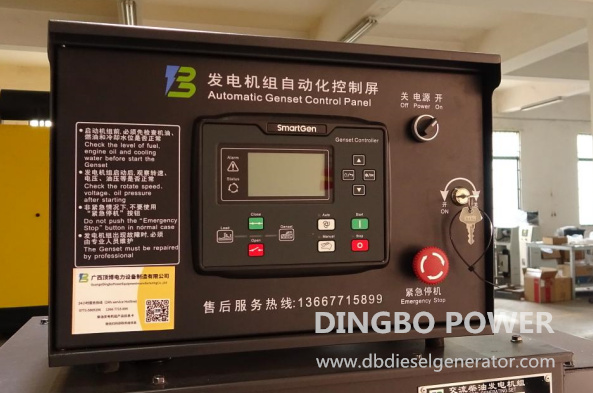In modern times, diesel generators are a reliable source of power generation. A generator controller plays an important role in ensuring the proper operation and maintenance of the equipment. In this article, we’ll explain what a diesel generator controller is and introduce some popular generator controller brands.
What is a diesel generator controller?
A diesel generator controller is a device that integrates an electronic module, an engine control module (ECM), a charging alternator monitoring module, and programmable relays committed to protecting all systems of the diesel power generator. It is designed to monitor, control, and protect the generator, ensuring optimal performance and reliability. The controller monitors the parameters of the engine, such as oil pressure, temperature, fuel and speed, and generator functions. In addition to the real-time monitoring of critical generator parameters, the controller also provides the basic engine/generator safeties and auto-start functions. It can detect faults, irregularities, or abnormalities and show warnings including low oil pressure, high temperature, low coolant level, over/under frequency (speed), etc. and automatically shut down the engine to prevent further problems. Complex controllers typically installed on larger diesel generator systems often enable remote monitoring and control. They can also ensure the synchronization of multiple generators within a power system.

How does a diesel generator controller work?
Diesel genset controllers enable you to monitor and manage your power generation systems with precision and efficiency. They rely on a range of sensing devices to gather real-time data on the electrical parameters. Typically, the key sensing devices include voltage sensors, current sensors, temperature sensors, frequency sensors, oil pressure sensors, fuel level sensors and so on. These sensors help to provide essential feedback to the controller. The genset controller monitors the signals to make informed decisions regarding power generation.
A Microcontroller Unit (MCU) serves as the brain of the generator controller. It is a compact integrated circuit designed to govern a specific operation in an embedded system. It can process the data received from sensing devices, execute control algorithms, and issue commands to the generator system. The MCU can be used to make an Electronic Control Module (ECM), which receives input from various sensors on the engine and uses this information to make corresponding adjustments to ensure optimal performance.
The generator control panel is a user interface that allows you to control, monitor and diagnose your diesel generator set with ease. It is a display parameter that presents different details and parameters regarding the generator whilst the generator is running. Control panels are usually fitted with buttons or switches that help to operate the generator such as a switch-off button or turn-on key. In addition to having the on/off switch, generator control panels have buttons that allow the generator operator to program specific functions or to monitor specific parameters.
Communication modules, such as Ethernet, Wi-Fi, or cellular connectivity, in diesel generator controllers are vital for remote monitoring and control. These modules facilitate remote monitoring and control, enabling real-time adjustments and data access from anywhere in the world. They allow for easy connection to the controller and authorized personnel for maintaining the equipment.
Some common diesel generator controller brands
Deep Sea
Deep Sea Electronics (DSE) is one of the world’s top manufacturers of generator controllers and automatic transfer switch controllers. The company is based in the United Kingdom and has over 45 years of experience. Diesel generator sets equipped with Deep Sea controllers are commonly used in industrial, commercial and residential applications.
SmartGen
SmartGen Genset Controllers are manufactured by SmartGen (Zhenzhou) Technology Co.,ltd., a listed company on Shenzhen Stock Exchange GEM. The company was founded in 1998 in China. They specialize in automatic control systems for internal combustion generator sets, low-voltage distribution automatic control systems, new energy automatic control system and other related automatic products. SmartGen Genset Controllers are known for their affordability and reliability.
ComAp
ComAp is also a well-known genset controller brand. ComAp was founded by in 1991 in the Czech Republic and it has grown into a global industry leader for smart energy control. They design and deliver smart control solutions for power generation. Their genset controllers have a reputation of user-friendly interface and powerful performance.
Contact Dingbo Power to get right advice
Dingbo Power is a professional manufacturer and supplier of diesel generator sets with over 17 years of experience. We are an authorized OEM supplier of diesel engines for generator sets including Cummins, Deutz, Weichai, Yuchai, SDEC, MTU, Ricardo, Wuxi, etc. Our AC generators include Shanghai Stamford, Leroy Somer, Marathon, Siemens and Engga and so on. We offer trusted diesel generator set controller brands like SmartGen, ComAp and Deep Sea to meet diverse power needs. Don’t hesitate to reach out for any further information or assistance regarding to power generator controllers or products & services we provide. Contact us at dingbo@dieselgeneratortech.com, and we will gladly help you.
Comments
Post a Comment